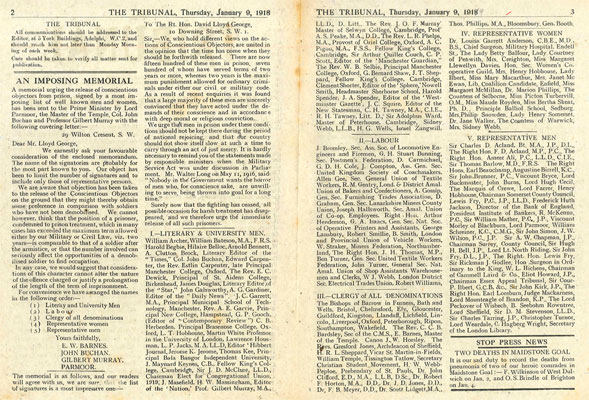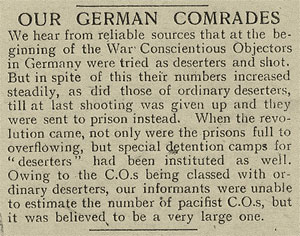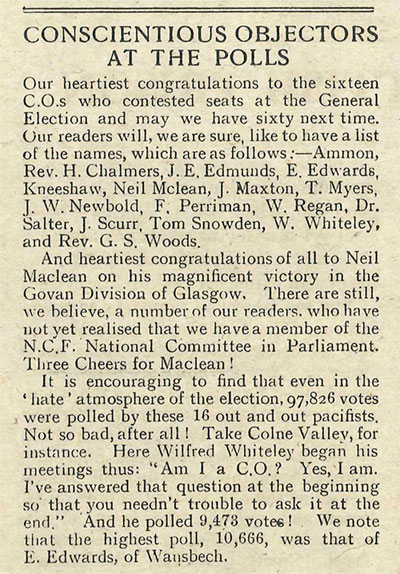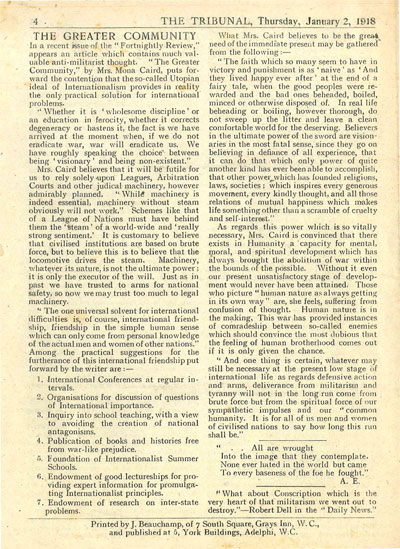
| HOME | TRIBUNAL HOME |
January 1919
A new year dawned for the NCF, and only the state of the war had changed. Now an “armistice”, and increasingly clearly the final end of the war, but no release for Conscientious Objectors, no end to Conscription and even - astonishingly - new men arrested and imprisoned for the crime of refusing to fight in a war now over. The struggle was not yet over, but 1919 saw the Tribunal ever increasingly turn it’s gaze towards the future. These plans and hopes, put forward in the pages of the Tribunal, will form the focus of our article on the first month of the new year.
CO Deaths in January:
Oliver Brindle
George Dardis
Frederick Wilkinson
January 2nd: The Greater Community
After the Socialist dream of internationalism had been shattered by the onset of the war in 1914, it had been steadily building as a viable keystone of future peace. The Tribunal staff and the wider NCF had long been committed to internationalism, but “The Greater Community” was not written by an NCF staff member, but was a reprint from the “Fortnightly Review”, written by Mona Caird. Even with the war over, censorship and political pressure was still being exerted on the Tribunal, and reprints were a safe and convenient way of printing.
The Greater Community details both the potential and the hope of Internationalism as a way of building a relationship between both people and nations. Instead of relying on “Leagues, Arbitration, Courts and other judicial machinery”, Internationalism could instead be fostered through the “one universal solvent for international difficulties is, of course, international friendship in the simple human sense which can only come from personal knowledge of the actual men and women of other nations”.
Peace, so long looked for, had to be constructive. Not just a space between wars, but a permanent and self-perpetuating relationship between nations, groups and individuals. It was not enough to rely on the cessation of hostilities bringing peace through punishment of the losing party - “The faith which so many seem to have in victory and punishment is as “naive” as “and they lived happily ever after” at the end of a fairy tale”.
The article is utopian, but also practical and looking forward to the current European Union and it’s frameworks for cultural (and population) exchange. Peace can be made through international conferences, through education and discussion, through knowledge and the light of reason - and through trips to foreign countries. Travel and education were to be the key to a pan-European experience of peace, a new form of practical internationalism based on familiarity, friendship and financial interdependence.
As we read through 1919, so concerned with the peace to come, it’s going to be easy to tint everything with a (justifiably) tragic light, but the articles that would soon fill the pages of the Tribunal were written when the world seemed to be utterly exhausted, and a constructive peace seemed difficult - but not impossible.
January 9th: An Imposing Memorial
The NCF continued to organise and publicise a seemingly endless tide of petitions for the release of imprisoned Conscientious Objectors. This “memorial urging the release of conscientious objectors from prison” stands out for the sheer length and significance of the names that signed it.
The petition itself is straightforward, calling for the release of COs to accompany the cessation of hostilities, and reminds the recipient, intended to be Prime Minister Lloyd George, of the Government’s statement of May 1919: “Nobody in the Government wants the horror of men who, for conscience sake, are unwilling to serve, being thrown into gaol for a long time”. Clearly, despite the “different views on the actions of Conscientious Objectors” held by those who had signed the letter, the time for release had come, and the sense of injustice at continuing imprisonment was mounting.

It’s the signatories, however, that make it an interesting petition. Divided into four categories - Literary and University, Labour, Clergy, Representative Women and Representative Men - they describe some of the leading figures of British society at the time. It’s not just the “usual suspects” of CO supporters and socialists but includes notably pro-war individuals, Liberals, Conservative and pillars of the establishment. Men like Hilaire Belloc, Jerome K. Jerome and Masters of Cambridge Colleges (Selwyn and Peterhouse), or Headmasters of prestigious Schools, were not firebrand anti-war socialists, and their presence on the lists of names show the increasingly widespread support this aspect of the CO cause gathered. The Tribunal realised that, looking forward, their experiences could be used to win over the public to sympathy, if not outright support.
It’s well worth taking a look through the list - which we’ve reproduced in its entirely.
16th January 1919: COs at the Polls
The 1918 General Election had officially been called for the 14th of December, but with the vast numbers of overseas votes and hugely expanded electoral roll (all men over 21, and women over 30 were added by electoral reform in 1918), vote counting did not begin until the end of the month. “Conscientious Objectors at the Polls” records the sixteen objectors who stood for election - and the one who successfully won his seat.
Neil MacLean won the Glasgow seat of Govan, putting a Conscientious Objector - nominally a disenfranchised class (provided that they had been imprisoned), into the House of Commons. Others lost their contests by narrow margins, and all this in a khaki election dominated by war-related issues.
For a community whose members were still undergoing “punishment” for their apparent crimes, and who were resolved to look actively forward to the establishment of a better and more peaceful world, political representation was very important. Not only does the election of Neil MacLean show that the popular myth of the “hated CO” is just that, a myth, it also provided an enduring hope for the future. With so many prospective supporters, nominees and organisers in prison, COs had still successfully contested (and in some cases very nearly won) several Parliamentary seats. What kind of future would beckon for the movement when it’s representatives were able to stand around the country? MacLean would be the first CO in Parliament, but certainly not the last: his time in Parliament, lasting astonishingly until 1950, would see around 100 CO MPs pass through the House, on their way to important positions in government, opposition and the cabinet, in both the Commons and the Lords. The last, Bernard Taylor, was still attending Parliament in 1989.
23rd January 1916: Our German Comrades
The story of Conscientious Objection in Germany was effectively hidden from the British anti-war movement between 1914 and 1918, with a few significant examples. Supposedly revealing the true story, this short article may have shown British COs that the system they experienced was only one of a range of brutal possibilities:
“We hear from our reliable sources that at the beginning of the war Conscientious Objectors in Germany were tried as deserters and shot. But in spite of this their numbers increased steadily, as did those of ordinary deserters, till at last shooting was given up and they were sent to prison instead.”
How reliable these sources were is difficult to ascertain - German COs do not seem to have been shot and were in effect treated in the same manner as their British comrades, but with no conscience clause to secure them at least nominal legal status as COs, German conscripts had to work entirely within a military framework. This meant accepting non-combatant work, or refusing and facing incarceration in prison or mental asylum. The story told to the Tribunal seems therefore to be a mix of rumour and fact - 1919 did not provide a stable platform for accurate news from Germany.
 The way the tale is told is a salutary lesson the benefits of collective action, so from the point of view of the Tribunal, accuracy is not all that important. If execution was abandoned, it was abandoned in the face of selfless resistance - a “steadily increasing” tide of COs willing to die for their beliefs, ended the policy. More than news, then, Our German Comrades is a lesson, even a fable, in the staunch resistance of Conscientious Objectors, no matter their nationality, in the face of militarism.
The way the tale is told is a salutary lesson the benefits of collective action, so from the point of view of the Tribunal, accuracy is not all that important. If execution was abandoned, it was abandoned in the face of selfless resistance - a “steadily increasing” tide of COs willing to die for their beliefs, ended the policy. More than news, then, Our German Comrades is a lesson, even a fable, in the staunch resistance of Conscientious Objectors, no matter their nationality, in the face of militarism.
Clink on images to enlarge

